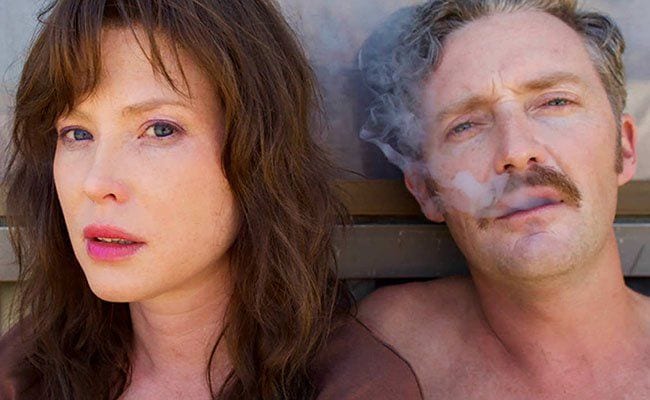
Hounds of Love, the bold debut feature of Australian filmmaker Ben Young, follows in the footsteps of compatriot Justin Kurzel’s own viscerally disturbing urban nightmare debut, Snowtown (2011). Young’s film can only be described as a gruelling experience to be endured, fraying the nerves as early as the halfway mark. Through its sheer sense of presence, it does not ask for, but rather it demands an appreciation for the visceral experience it cultivates.
Young tightly constructs his film around the claustrophobic captivity of Vicki (Ashleigh Cummings), who is lured to and then imprisoned in the home of serial killer couple John (Stephen Curry) and Evelyn (Emma Booth). The act of narrative isolation is one that calls to mind David Fincher’s Se7en (1995), whose story was told from the isolated perspective of the investigators. Whether or not this is the storyteller teasing his audience, it’s nonetheless an effective creative choice.
In spite of Vicki’s recently separated parents’ search running parallel to our increasingly isolated view, its sparse inclusion as a thread to alternate between search and captivity forces us into the uncertainty that defines her experience. This increasing sense of segregated and claustrophobic suffering preys upon our hope of escape, as Hounds of Love meticulously inches it’s way towards an emotionally dramatic and uncertain crescendo.
Amidst this conscientious construction the narrative has an air of starkness, the cast of characters complicating the simplicity of the drama with their mix of impulsive, cruel and volatile natures. Fate, or rather the question of it, plays a part in the film. It’s a subject on which Franklin D. Roosevelt said: “Men are not prisoners of fate, but only prisoners of their own minds.” It’s a sentiment that echoes The Buddha’s teaching in The Dhammapada: “Our life is shaped by our mind; we become what we think.” While it’s easy to see Vicki disobeying her mother to sneak out to a party and into the clutches of her captors as an act of fate, in reality it’s one of not individual, but communal choices. It echoes the sentiments of The Buddha and Roosevelt in that she is a victim of her own rebellious and impulsive nature, that in turn shapes her future.
Yet Hounds of Love looks to destiny as a communal interaction — Vicki’s captivity a consequence of her own mind in as much as it’s a convergence with the minds and actions of her captors. Therein when Vicki and Evelyn converse on the irony of her fateful choice to forsake the safety of her mother’s home, it’s cast as nothing more than an admittance of the unpredictable consequence of actions. Although Evelyn’s reference to fate, a thought that will already have occurred to us long before, sees it convoluted by the habitual human practice to explain life’s events away with mysticism.
The irony, however, is more deeply layered by way of Vicki identifying her mother as the one that fractured her parents’ marriage; her mother’s new home is neither a place she feels nor wants to belong. Therein, Vicki’s mind and actions constitute her fate, yet as one person in an intricate and long spanning network of lives and choices, an expansive tapestry of cause and effect, it illuminates that both Roosevelt and The Buddha are guilty of an oversimplification.
This submission to spiritual inclinations is evidence of a thoughtful piece of filmmaking, its pervasive sense of dread underpinned with a dark philosophical underbelly that merges oppressive mood with ideas. While the suffering inflicted upon Vicki is not a proportionate reaction, it speaks to the narrow margin between being in and out of control; predator or prey. John and Evelyn embody this duality amidst the introverted versus the extroverted strength of personality — John and Evelyn society’s introverted predators, as opposed to the extroverted thugs that intimidate openly, to whom John is prey on this urban food chain.

Stephen Curry as John
The opening casts the camera’s perspective as an overtly sexualised one, dehumanising and objectifying the adolescent school girls in the way their bodies are framed in slow motion. It’s an act of voyeurism that accentuates the presence of the unseen and unexpected threat from introverted killers. Evelyn’s character looks to the submissive woman embroiled in those unspeakable crimes that scar a society, expanding the film’s inclination towards a study of submissive tendencies. In director Young and actress Booth’s hands she’s a compelling character, offering a portrait of a woman in emotional and psychological conflict, her identity under construction as her conscious and unconscious personalities and instincts duel, complicating the idea of fate as one that is shaped by unstable minds.
It’s here where those brief moments of Vicki’s mother’s search feeds into this study of women. A woman who has reclaimed her independence from her husband and an unsatisfactory marriage offsets Evelyn’s own submission to John. Hounds of Love is a perhaps most aptly described as a story about the confrontation with and resistance to submission, whether it be in the form of masculinity or mysticism.
If the film’s characters must accept the uncertain consequences of their actions and not look to mysticism, then that same uncertainty bleeds into the audiences experience of the film. Loyal to the creation of emotion, Hounds of Love creates an experiential uncertainty up until the final shot, drawing out this gruelling experience in which we encounter the foreboding realisation that we may experientially remain captive in this circle of hell, depending on the outcome.


![Call for Papers: All Things Reconsidered [MUSIC] May-August 2024](https://www.popmatters.com/wp-content/uploads/2024/04/all-things-reconsidered-call-music-may-2024-720x380.jpg)



